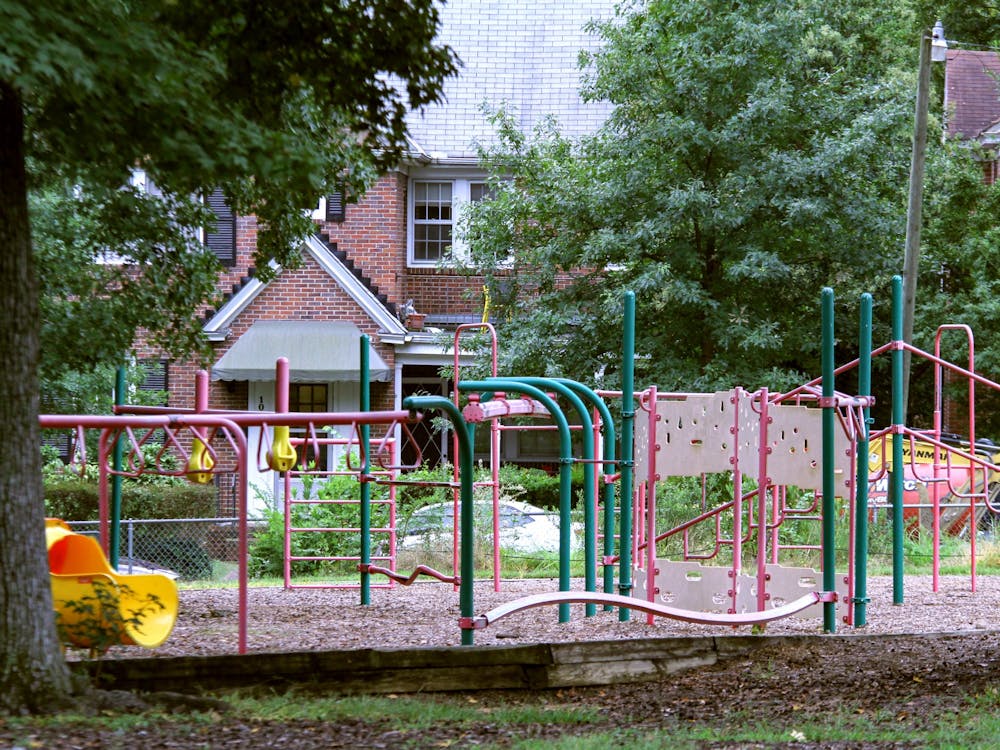Even amid the virtual school year’s increase in workload and challenges related to equity, technology and supervision, Durham Public Schools teachers are teaching and students are learning, teachers and administrators say.
Following North Carolina Gov. Roy Cooper’s Sept. 17 announcement granting public elementary schools discretion to choose their reopening plans for the upcoming quarter—including the option of daily in-person classes—the Durham Public Schools Board of Education decided by a 6-1 vote last Thursday to remain virtual at least until next semester.
Neal Middle School Principal Michael Fuga said that one of the silver linings of the coronavirus pandemic is that the school has been able to increase its communication with families. The administration sends out weekly messages updating parents and assessing families’ needs.
Neal has an ongoing partnership with Summit Church, Fuga said, which helps distribute 50 bags of food, 50 bookbags and 30 hygiene bags to families every Wednesday.
Fuga said he hopes the school’s efforts to connect with students and their families will help make up for lost in-person time, since it is much more difficult right now to build supportive and trusting relationships.
“When we get back in the building, which eventually we will, we’ve built that positive rapport connection, like ‘Hey, when we needed something the school was really there,’” Fuga said.
Fuga said he prides himself on learning the names of every student at Neal—a daunting task, given that the middle school currently has around 860 registered students. The virtual learning environment has seriously hindered his ability to get to know students, he said, particularly sixth graders who just entered the school.
“But now I’m popping into these virtual classrooms three, four, five times a day, doing the best I can,” Fuga said. “I’m seeing these kids for the first time on a screen, but I don’t want to interrupt instruction to get to know them. It’s really challenging.”
Fuga said that although he worries about students falling behind academically, his chief concern is that the school may not be attuned to students who do not have their basic needs met.
“I’m always concerned about our kids' needs,” Fuga said. “When they’re in school, you can see that they need new clothes, they need more food, they need school supplies, housing. But this year, we don’t know because we don’t see them every day.”
Fuga is also concerned about meeting students’ academic needs. He said that around 40% of Neal’s students fall under the English as a Second Language or Exceptional Children categories, and 76% of last year’s incoming sixth graders were behind grade level in academic performance.
Although the school is doing its best to provide extra resources and face-to-face time for those students, Fuga acknowledged that the situation is an uphill battle.
“We’re trying to bridge these gaps as well as they can, but it’s not the same. They came to us with gaps, and now those gaps are even larger, unfortunately,” he said.
Chelsea Williams, who runs the Academically and Intellectually Gifted program at E.K. Powe Elementary School and works with second through fifth grade students, echoed this concern. She said the district has put a strong emphasis on teachers getting enough virtual face-to-face time with students and checking in with them.
“Normally school is a way to check for abuse or issues like that,” she said, and virtual learning makes that far more difficult.
All DPS schools observe “Wellness Wednesdays,” a day devoted to social-emotional wellness. Williams said that at E.K. Powe, students typically check in with their counselors on Wednesdays, and otherwise have minimal Zoom instruction time.
Fuga said that his students do not have synchronous class time on Wednesdays, but next quarter the school may implement optional club meetings in an attempt to engage students in extracurricular learning.
Williams emphasized the difficulty in engaging with students virtually. She said that although attendance is mandatory by law, the district can’t require students to turn on their cameras during Zoom classes, so some students rarely actively participate in class.
She said that “the amount of work teachers have to do has doubled or tripled,” as creating content that actively engages students in a virtual environment requires much more time and creativity.
However, Fuga and Williams both said that many teachers have had success with new technologies. At both of their schools, students have access to district-provided computers. Although it did not happen immediately, Williams explained that DPS was also able to provide internet hotspots to students without wireless connections at home.
Get The Chronicle straight to your inbox
Sign up for our weekly newsletter. Cancel at any time.
One of Williams’ favorite tools is Pear Deck, a software that turns slides into interactive workbook pages that students can add to simultaneously and anonymously. She also had rave reviews of Jamboard, which she described as the virtual version of giving students “a giant poster board on a table.”
“Any time that kids get to be creative and collaborative, engagement goes up like crazy,” Williams said.
Fuga said that Neal teachers have had luck with Flocabulary, an app that teaches vocabulary through rapid rhyme, and Newsela, which creates several versions of the same article, tailored to different reading levels. The school also uses Dyknow, a classroom management software that lets teachers monitor students’ activity during synchronous class time, ensuring that they remain focused.
Both Fuga and Williams said that although nobody—parents, teachers or students—believes that virtual education is ideal, the Durham community overall agrees that safety is the current priority.
Although DPS had the option this summer to implement “Plan B”—the hybrid model of in-person and virtual learning adopted by the majority of North Carolina schools—safety concerns convinced Durham to continue virtually.
Most families' apprehension regarding COVID-19 remains high: Surveys showed that “Plan C”—fully remote learning—appealed to two-thirds of Durham’s elementary school families and three-fourths of its middle school families.

Anna Zolotor is a Trinity senior and recruitment chair for The Chronicle's 118th volume. She was previously news editor for Volume 117.

